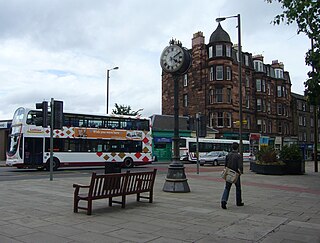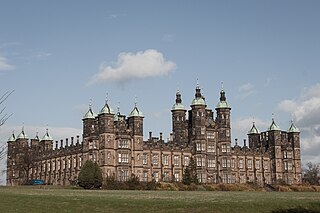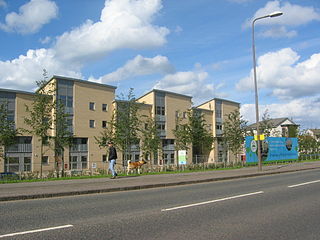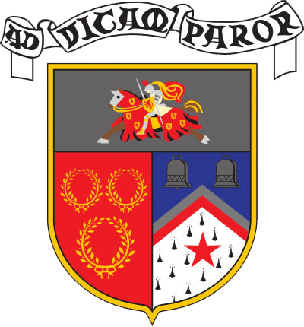
The Edinburgh Academy is a private day school in Edinburgh, Scotland, which was opened in 1824. The original building, on Henderson Row in the city's New Town, is now part of the Senior School. The Junior School is on Arboretum Road to the north of the city's Royal Botanic Garden.

RNIB is a British charity, founded in 1868, that serves people living with visual impairments. It is regarded as a leader in the field in supporting people in the UK who have vision loss. The organisation seeks to increase awareness of the lived experiences of people who are blind or partially sighted. Additionally, it campaigns to make services such as healthcare, education and public transport safer and more accessible to people with visual impairments.

Newington is a neighbourhood of southern Edinburgh, Scotland. Developed from the early 19th century, it is an affluent, predominantly residential area.

Morningside is a district and former village in the south of Edinburgh, Scotland. It lies alongside the main arterial Morningside Road, part of an ancient route from Edinburgh to the south west of Scotland. The original village served several farms and estates in the area. In the 19th century, it developed as a residential suburb, its growth being stimulated by the arrival of a railway service and other transport improvements.

Donaldson's School is Scotland's national school for the deaf. Originally situated in Edinburgh, it moved to a new location in Linlithgow in 2008. It is a residential and day school that provides education, therapy and care for pupils who are deaf or who have communication difficulties.

Stewart's Melville College (SMC) is a private day and boarding school in Edinburgh, Scotland. Classes are all boys in the 1st to 5th years and co-educational in Sixth (final) year. It has a roll of about 750 pupils.

The Mary Erskine School, popularly known as "Mary Erskine's" or "MES", is an all-girls private secondary school in Edinburgh, Scotland. It was founded in 1694 and has a roll of around 750 pupils. It is the sister school of the all-boys Stewart's Melville College (SMC) with which MES shares a coeducational nursery and junior school for pupils aged 3–11.

Niddrie is a residential suburb in Edinburgh, Scotland. It is situated in the south-east of the city, south-west of the seaside area of Portobello, and west of Musselburgh in East Lothian near Fort Kinnaird retail park. The western section of Niddrie is also known by the alternative name of Craigmillar.

Broughton High School is a secondary school located in the north of Edinburgh, Scotland. In 2009, the building at Inverleith was replaced with a building funded by a public–private partnership. The school is currently situated next to Inverleith Park, in the Stockbridge neighbourhood of Edinburgh but was formerly in Broughton, where the poet Hugh MacDiarmid was a pupil.
Paisley Grammar School is a secondary school in Paisley, the largest town in Renfrewshire, Scotland. The school was founded in 1576 by royal charter of King James VI and is situated on Glasgow Road. The school is recognised as one of Scotland's oldest schools with an established history.

Lasswade High School is a non-denominational secondary state school in Bonnyrigg, Midlothian, Scotland. It has a roll in excess of 1500 students. The school's catchment area covers the towns of Bonnyrigg, Loanhead, Rosewell and surrounding villages.
St. Margaret's School was an independent school in the Newington area of Edinburgh, Scotland. The curriculum was based on the Scottish education system. The school was one of three all-girls, private, fee-paying schools based in the Edinburgh district. The school was a primarily a day-school, but did offer boarding to cater for students staying away from home.

Bell Baxter High School is a non-denominational comprehensive school for 11 to 18 year olds in Cupar, Fife, Scotland. Founded in 1889, it educates over 1,500 pupils mainly from the surrounding villages.

Elizabeth Gemma Clegg is a British Paralympic sprinter and tandem track cyclist who has represented both Scotland and Great Britain at international events. She represented Great Britain in the T12 100m and 200m at the 2008 Summer Paralympics, winning a silver medal in the T12 100m race. She won Gold in Rio at the 2016 Paralympic Games in 100m T11 where she broke the world record and T11 200m, beating the previous Paralympic record in the process, thus making her a double Paralympic champion.
Henshaws Society for Blind People is a specialist charity providing support, advice and training to anyone affected by sight loss and other disabilities.

James Clegg is a British Paralympic swimmer. Clegg competes in S12 events and qualified for the 2012 Summer Paralympics, winning the bronze in the men's 100 m butterfly event. He is the brother of fellow para-swimmer Stephen Clegg and para-athlete Libby Clegg.

Scotland's Rural College is a public land based research institution focused on agriculture and life sciences. Its history stretches back to 1899 with the establishment of the West of Scotland Agricultural College and its current organisation came into being through a merger of smaller institutions.

Sight Scotland is a Scottish Charity based in Edinburgh, Scotland founded in 1793. The charity provides care, education and employment for people of all ages who are blind or partially sighted. Sight Scotland provides the following services: Royal Blind School, Forward Vision, Scottish Braille Press and Kidscene. Sight Scotland’s sister charity is Sight Scotland Veterans.
Reverend Thomas Burns (1853–1938) was a Scottish minister and strong campaigner for the blind. As Chair of the Royal Blind School in Edinburgh he was the creator of the Thomas Burns Home which was named after him. He was also an author on several historical subjects.

Stephen Clegg is a British Paralympic swimmer.


















